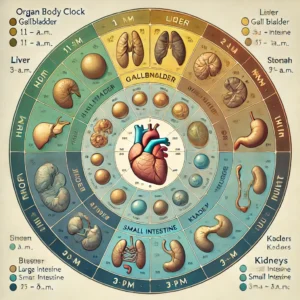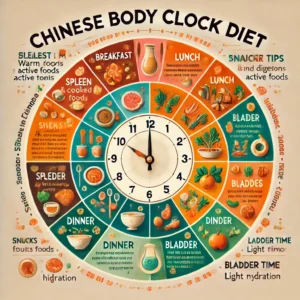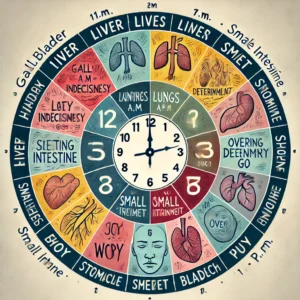Traditional Chinese body clock works within human body system to create balanced healthy lifestyle. According to Chinese Medical System, they follow human body clock with system observances to develop their body mind health or to recover lost health balances.
This Chinese body clock decides human body organ system functions for each organ to particular hours. You may find interesting information on Chinese body clock guidance with medicine and acupuncture.
If you suffer from hemorrhoids find Best high Fiber Foods and Worst Foods for Hemorrhoids Treatment
Chinese Body Clock Theory
I was interested in knowing about Chinese body clock when I begin to wake up at a particular hour in every night daily.
Then I wanted to search for meaning for my waking up in night at same time daily I have found Chinese body clock theory.
The body clock theory which was rooted in Traditional Chinese Medicine (TCM), suggests that the body’s each organs function at a particular hour within 24-hour cycle system.
Each organ is linked to a two-hour window, which influences energy flow (Qi) and overall health. The theory emphasizes the connection between the body’s rhythms and natural cycles to promote holistic well-being.
Diabetes is a terrible sickness in the world today. It is better to know about diabetes before it catch you. Basic Knowledge on Diabetes: Causes, Symptoms, Treatments, Types & Preventions
Chinese Body Clock – Specific Meaning of Each Two-Hour Period

Here you will find how Chinese Body Clock works with human body organs at particular times.
11 p.m. – 1 a.m. (Gallbladder)
According to the Chinese body clock system, the gallbladder is responsible for storing and releasing bile to aid digestion. During this time, the body is detoxifying and replenishing energy. Proper sleep here supports decision-making and emotional balance.
1 a.m. – 3 a.m. (Liver)
The liver detoxifies the blood and processes emotions like anger. Waking during this time may signal anger, frustration, or toxin buildup. As it is mentioned in Chinese body clock, it’s important to rest fully to support liver function.
3 a.m. – 5 a.m. (Lungs)
The lungs are most active, and the body absorbs oxygen and eliminates waste gases. This time is associated with grief and sadness. The Chinese body clock suggests that deep breathing and restful sleep are crucial for lung health.
5 a.m. – 7 a.m. (Large Intestine)
The large intestine eliminates waste from the body. The Chinese culture brings it out meaningfully that drinking warm water and going to the bathroom during this time supports proper digestion and detoxification. The Chinese body clock system emphasizes that during 5am – 7am we need to focus on how to remove our inner waste from our body.
7 a.m. – 9 a.m. (Stomach)
The stomach’s energy is strongest, making this the best time for a substantial, nutritious breakfast. Proper eating here helps with digestion throughout the day.
9 a.m. – 11 a.m. (Spleen)
The spleen governs digestion, absorption of nutrients, and immune function. The Chinese body clock indicates that this is the time to focus on productive tasks as energy is high, and metabolism is efficient.
11 a.m. – 1 p.m. (Heart)
According to the Chinese body clock at this time the heart is at its peak, and blood circulation is strong. It’s the ideal time for social interaction, work, and enjoying a healthy, moderate lunch.
1 p.m. – 3 p.m. (Small Intestine)
The small intestine is busy digesting and absorbing nutrients. It’s common to feel tired after lunch; resting or taking a short nap supports digestion and energy balance.
3 p.m. – 5 p.m. (Bladder)
The bladder works on storing and eliminating liquid waste. The Chinese body clock is always emphasizing that drinking water and staying hydrated is important during this period to assist detoxification.
5 p.m. – 7 p.m. (Kidneys)
These hours are most important hours as it is mentioned in Chinese body clock for kidneys are the body’s energy reservoir and are linked to vitality. Light physical activity or relaxation supports kidney health during this time.
7 p.m. – 9 p.m. (Pericardium)
The pericardium protects the heart, and this time is ideal for relaxing and spending time with loved ones. The Chinese integrates meditation into their daily lifestyle as it is mentioned in Chinese body clock. They calm activities and unwind promote emotional balance during these hours.
9 p.m. – 11 p.m. (Triple Burner / Endocrine System)
The Triple Burner regulates temperature and water pathways, controlling metabolism. It’s best to wind down, allowing the body to prepare for sleep and repair. Avoid heavy meals or stress before bed.
Chinese body clock shows how time periods reflect the flow of Qi, promoting a lifestyle in harmony with the body’s natural processes for optimal health and well-being.
Earning money online is an art and everyone wants to know it. You can also try to earn money online. How to Earn Money Online Or Offline Fast? 7 Common Methods For All
Chinese Body Clock Diet System

The Chinese body clock diet aligns eating habits with the body’s natural rhythms to optimize digestion, nutrient absorption, and overall health.
7 a.m. – 9 a.m. (Stomach)
It is better to follow breakfast diet according to the Chinese body clock system. This is the ideal time for a substantial, balanced meal to fuel the body for the day. Foods like warm porridge, whole grains, eggs, and steamed vegetables are recommended. Avoid cold or raw foods, as they may slow digestion.
9 a.m. – 11 a.m. (Spleen)
The spleen supports digestion, so it’s good to eat light snacks if needed. Foods that nourish the spleen include oats, sweet potatoes, and lightly cooked vegetables. The Chinese body clock avoids processed or overly sugary foods.
11 a.m. – 1 p.m. (Heart)
Lunch: The body is in its highest energy phase, so it’s a good time for a moderate, balanced meal. Include lean proteins (like chicken or fish), vegetables, and healthy fats. Overeating or consuming heavy, greasy foods should be avoided to prevent overburdening the heart.
1 p.m. – 3 p.m. (Small Intestine)
The small intestine is busy absorbing nutrients, so avoid heavy meals during this time. Light snacks or tea are recommended if hungry, but allow digestion to complete after lunch.
5 p.m. – 7 p.m. (Kidneys)
Dinner: Eat a light, nutritious meal such as soups, salads, or steamed vegetables. Avoid large portions and heavy foods in the evening as the body starts to wind down. Light meal at night is advisable for easy digestion.
9 p.m. – 11 p.m. (Triple Burner / Endocrine System)
By this time, it’s best to avoid eating altogether. The digestive system slows down, so heavy or late-night eating can disrupt sleep and metabolism.
General Tips for Chinese Body Clock Diet
Avoid cold and raw foods: These are believed to weaken the digestive fire, especially in the morning.
Eat warm, cooked meals: Especially at breakfast and lunch, to support the body’s natural processes.
Balance meals: Include whole grains, lean proteins, healthy fats, and a variety of vegetables.
Avoid overeating: Particularly at lunch and dinner, to prevent overburdening the digestive system.
Hydrate properly: Drink water throughout the day, especially between 3 p.m. and 5 p.m. (bladder time) to support detoxification.
Eating in harmony with the Chinese body clock helps maintain energy, digestion, and overall health.
Meditation is the best ancient practice to keep your body and mind balanced and healthy. Learn more about What Brainwaves and Frequency We Need for Meditation?
Chinese Body Clock Emotions

In Traditional Chinese Medicine (TCM), the Chinese body clock not only regulates physical functions but also connects each organ to specific emotions. Imbalances in these organs can lead to emotional disturbances, while emotional stress can affect the corresponding organ’s health.
11 p.m. – 1 a.m. (Gallbladder)
Emotion: Indecisiveness, bitterness, resentment.
Imbalance in the gallbladder can manifest as difficulty making decisions or holding on to negative emotions like bitterness or resentment.
1 a.m. – 3 a.m. (Liver)
Emotion: Anger, frustration, irritability.
The liver is linked to emotional balance. Waking during this time or feeling emotional tension may indicate unresolved anger or frustration.
3 a.m. – 5 a.m. (Lungs)
Emotion: Grief, sadness, loss.
The lungs are associated with processing grief and sorrow. Emotional pain from loss or sadness often affects lung health and vice versa. The Chinese body clock gives more instruction with regard to this matter.
5 a.m. – 7 a.m. (Large Intestine)
Emotion: Letting go (or holding on).
The large intestine governs elimination, both physically and emotionally. Difficulty letting go, whether of emotions or past experiences, can indicate an imbalance.
7 a.m. – 9 a.m. (Stomach)
Emotion: Worry, overthinking.
The stomach is sensitive to worry and overthinking, often leading to digestive problems when these emotions become excessive.
9 a.m. – 11 a.m. (Spleen)
Emotion: Overthinking, anxiety.
The spleen processes thoughts and is linked to overthinking or obsession. Excessive mental work can weaken the spleen, causing digestive issues and fatigue.
11 a.m. – 1 p.m. (Heart)
Emotion: Joy, but also excessive excitement or sadness.
The heart governs emotions and is connected to joy. Both an excess (mania, over-excitement) or deficiency (depression, sadness) of joy can affect heart health.
1 p.m. – 3 p.m. (Small Intestine)
Emotion: Discernment, clarity.
The small intestine aids in mental clarity and processing information. Emotional confusion or difficulty in separating important from trivial issues may indicate an imbalance.
3 p.m. – 5 p.m. (Bladder)
Emotion: Fear.
The bladder, paired with the kidneys, is influenced by fear. Chronic fear or anxiety can weaken bladder and kidney function.
5 p.m. – 7 p.m. (Kidneys)
Emotion: Fear, insecurity.
The kidneys are the seat of willpower and vitality. Excessive fear, insecurity, or lack of determination can signal an imbalance in the kidneys.
7 p.m. – 9 p.m. (Pericardium)
Emotion: Emotional protection.
The pericardium shields the heart from emotional distress. Feeling emotionally guarded or overwhelmed by external stressors may indicate an issue here.
9 p.m. – 11 p.m. (Triple Burner / Endocrine System)
Emotion: General stress, imbalanced energy.
The Triple Burner governs the body’s energy channels and regulates stress. Emotional and physical stressors may disrupt energy flow, impacting overall balance.
Each organ in the Chinese body clock is not only linked to physical health but also to emotional well-being. Balancing emotions in harmony with the Chinese body clock can enhance both mental and physical health.
3am 5am What Happens When It Goes Out of Balance?
Between 3 a.m. and 5 a.m., the lungs are most active according to the Chinese body clock. During this time, the lungs perform essential functions like oxygenating the body and removing waste gases (like carbon dioxide) through breathing. The lungs are also linked to the emotion of grief and help process feelings of loss and sadness.
If you find difficulties in sleeping in nights you can practice meditation for sleep. You can learn more on Meditation and Sleep: A Pathway to Restful Nights
What Happens When the Lungs are Out of Balance According to the Chinese Body Clock?
Physical signs: Imbalances in the lungs can lead to respiratory problems like coughing, shortness of breath, or asthma. You may also experience skin issues, as the lungs control the skin in TCM, leading to dryness or other conditions. You may have a better understanding on Chinese body clock for maintaining good health in mind and body.
Emotional signs: An imbalance in lung energy often manifests as unresolved grief or sadness. People may feel overly melancholic, find it hard to let go of past emotional pain, or even experience frequent crying.
Waking up between 3 a.m. and 5 a.m.: As it is mentioned in Chinese body clock, this may be a sign of lung imbalances or suppressed emotions, particularly unresolved grief. It could also point to issues with breathing or circulation, signaling that your lungs are struggling to regulate energy flow properly.
To restore balance, practices like deep breathing exercises, meditation, or seeking emotional release through counseling can help.
What Meridian is Active at 3am?
The Lung Meridian is active between 3 a.m. and 5 a.m. according to the Chinese body clock. This meridian governs the lungs, which are responsible for breathing, oxygenating the body, and removing waste gases like carbon dioxide. The Lung Meridian also plays a role in managing grief, sadness, and emotional balance, making this time ideal for emotional processing and healing through deep breathing and restful sleep.
When the Lung Meridian is out of balance, issues like respiratory problems (coughing, shortness of breath), skin issues, or emotional difficulties related to grief and sadness may arise.
What is the Best Time to Wake up According to Chinese Body Clock?
According to Traditional Chinese Medicine (TCM), the best time to wake up is between 5 a.m. and 7 a.m., when the Large Intestine Meridian is most active.
This period is ideal for eliminating toxins, both physically (through bowel movements) and energetically. Waking up during this time supports the body’s natural detoxification process, improves digestion, and helps the body prepare for the day ahead.
Follow Chinese body clock instruction for further details information.
Music is part of ancient meditation. When you integrate music in meditation you will have more health benefits and blessings. Learn more on Meditation Music Benefits: Origin, Types of Meditation Music and Relaxation from Stress.
TCM recommends starting the day with activities that promote cleansing and rejuvenation, such as drinking warm water, light stretching, or meditation. Rising with the sun aligns with the body’s natural rhythms, promoting balance and overall well-being.
Conclusion
The Traditional Chinese Body Clock links each organ to specific times of the day, enhancing overall health when balanced. It offers a holistic approach to understanding how our internal systems function in harmony with natural cycles.
Traditional Chinese medicine practitioners use this guide to optimize treatments like acupuncture and herbal remedies. By aligning daily routines with the body clock, individuals can improve energy flow and restore well-being. Embracing these principles promotes long-term health and balance in everyday life.





